KIA Niro: Heated Oxygen Sensor (HO2S)
Specification
HO2S (Bank 1/Sensor 1) (Linear)

HO2S (Bank 1/Sensor 2) (Binary type)

Description
Heated Oxygen Sensor (HO2S), consisting of zirconium and alumina, is
installed on both upstream
and downstream of the Manifold Catalytic Converter (MCC) to detect the air/fuel
ratio and send it to
the ECM. The sensor output voltage varies in accordance with the air/fuel ratio.
The sensor must be hot in order to operate normally. To keep it hot, the sensor
has a heater which is
controlled by the ECM via a duty cycle signal. When the exhaust gas temperature
is lower than the
specified value, the heater warms the sensor tip.
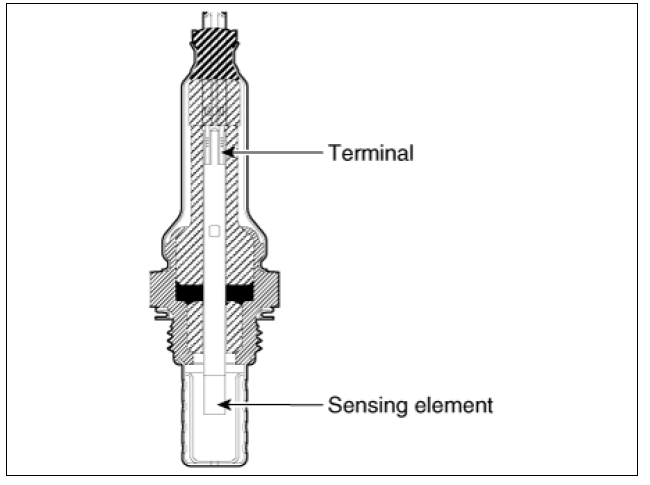
Inspection
- Switch "OFF" the ignition.
- Disconnect the HO2S connector.
- Measure resistance between the HO2S terminals 4 and 5 (B1/S1).
Specification: 2.5 - 4.0Ω (20ºC(68ºF))
- Measure resistance between the HO2S terminals 3 and 4 (B1/S2).
Specification: Approx. 9.0 Ω (21ºC(69.8ºF))
- Check that the resistance is within the specification.
Removal
Warning
Note that the SST (Part No.: 09392-1Y100 or 09392-2H100) can be used for removing the heated oxygen sensor.
Bank 1 / Sensor 1
- Switch "OFF" the ignition and disconnect the negative (-) battery terminal.
- Disconnect the connector (A), and then remove the sensor (B).
Heated oxygen sensor : 39.2 - 49.1 N*m (4.0 - 5.0 kgf*m, 28.9 - 36.2 lb*ft)
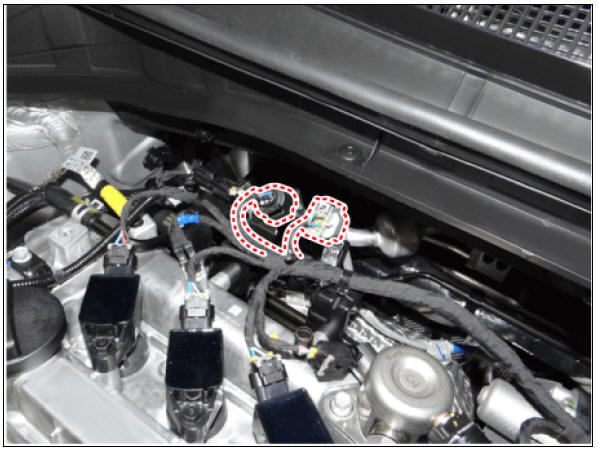
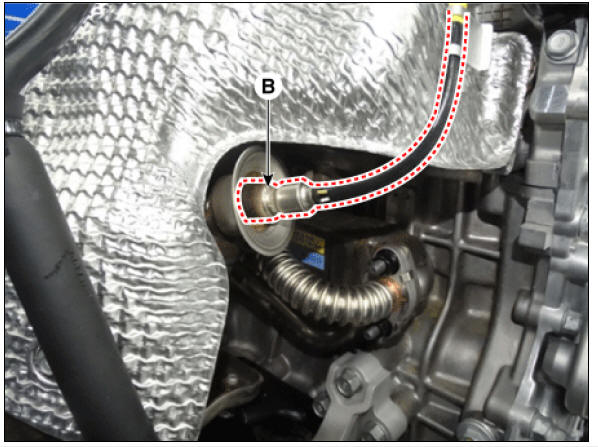
Bank 1 / Sensor 2
- Switch "OFF" the ignition and disconnect the negative (-) battery terminal.
- Disconnect the connector (A), and then remove the sensor (B).
Heated oxygen sensor : 39.2 - 49.1 N*m (4.0 - 5.0 kgf*m, 28.9 - 36.2 lb*ft)
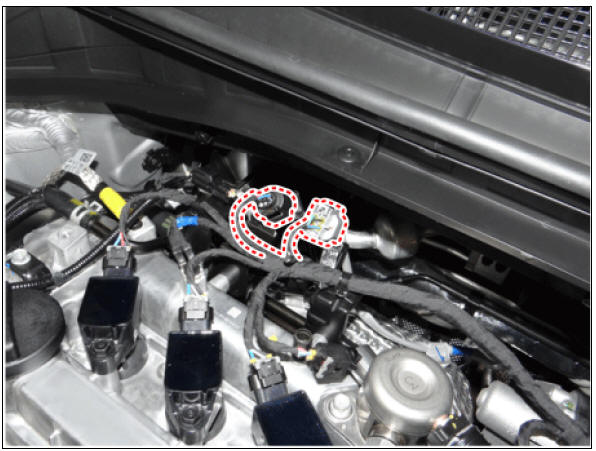
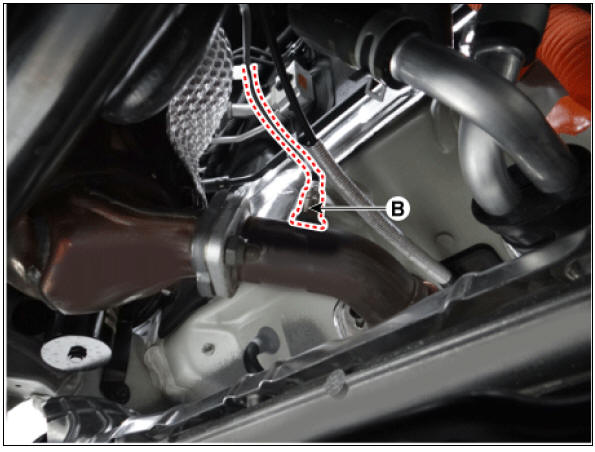
Installation
Warning
- Install the component to the specified torque.
- Note that internal damage may occur when the component is dropped. If the component has been dropped, inspect before installing.
Warning
- Keep the sensing element and connector free from cleaner, spray or grease as oil substance may cause the sensor to malfunction.
- Sensor and its wiring may get damaged from contact with the exhaust system (e.g. Exhaust Manifold, Catalytic Converter).
- Install in the reverse order of removal.
Description
Installed in exhaust manifold, the Exhaust Gas Temperature Sensor (EGTS) #1
for EWGA senses the
temperature of exhaust gas flowing into the EWGA.
Installed in Gasoline Particulate Filter (GPF) assembly, the Exhaust Gas Temperature Sensor (EGTS) #2 for DPF senses the temperature of exhaust gas flowing into the GPF.
When predetermined engine condition is met, ECM burns soot collected in DPF with exhaust gas.
During this, the exhaust gas temperature is an important factor of engine condition.
Specification
Exhaust Gas Temperature Sensor (EGTS) #1, 2
- Type : Thermistor type
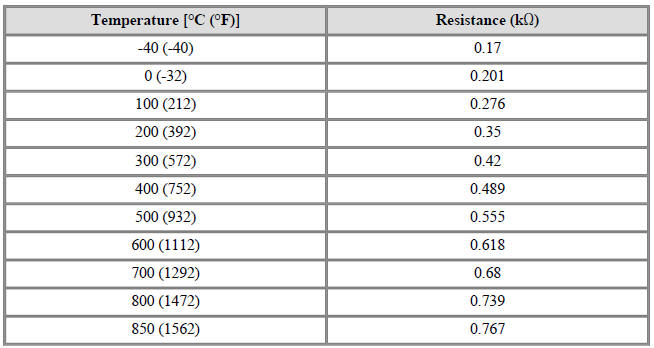
Circuit Diagram
EGTS #1

Harness Connector
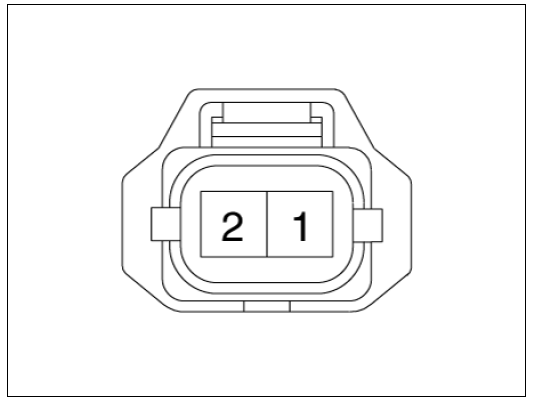
EGTS #2

Harness Connector
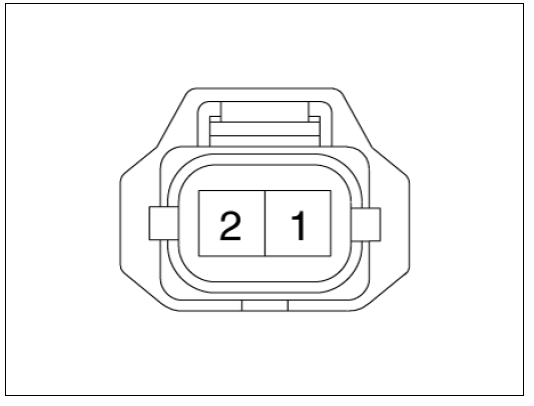
Inspection
- Turn ignition switch OFF.
- Disconnect the connector of exhaust gas temperature sensors #1/#2.
- Measure resistance between sensor signal terminal and ground terminal.
- Check that the resistance is within the specification.
Exhaust Gas Temperature Sensor (EGTS #1, #2 (T3, T4))
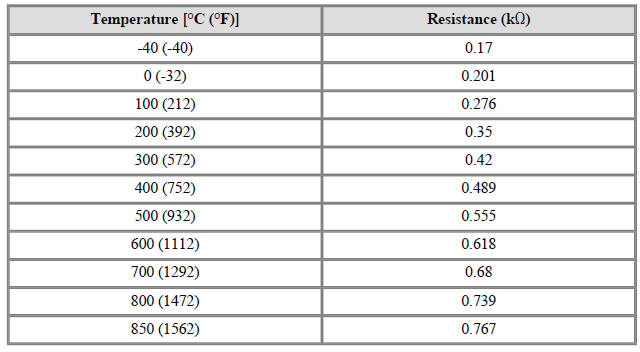
Removal
EGTS #1 (T3)
- Turn the ignition switch OFF and disconnect the battery negative (-) terminal.
- Lift the vehicle.
- Disconnect the EGTS #1 connector (A).
- Remove the EGTS #1 (B).
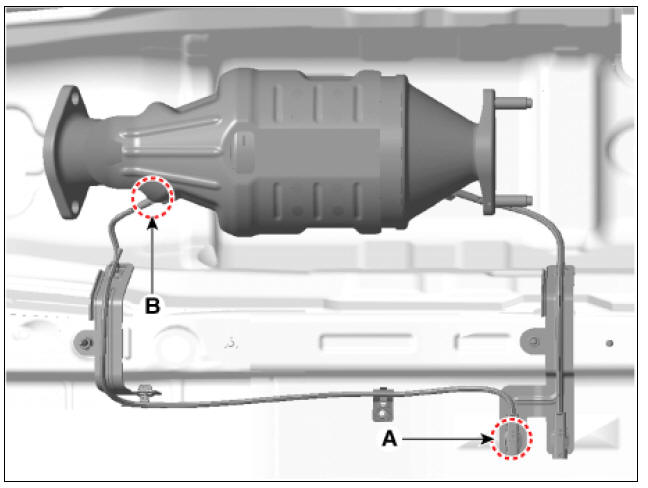
EGTS #2 (T4)
- Turn the ignition switch OFF and disconnect the battery negative (-) terminal.
- Lift the vehicle.
- Disconnect the EGTS #2 connector (A).
- Remove the EGTS #2 (B).
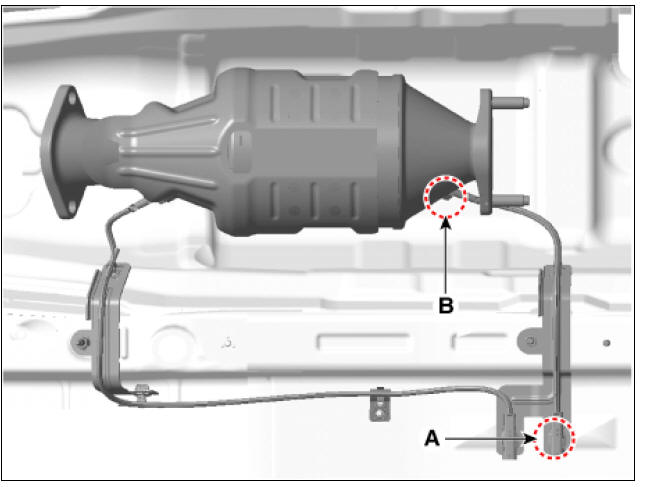
Installation
Warning
- Install the component to the specified torques.
- Note that internal damage may occur when the component is dropped. In this case, use it after inspecting.
- Install in the reverse order of removal.
READ NEXT:
 Rail Pressure Sensor (RPS)
Rail Pressure Sensor (RPS)
Specification
Rail Pressure Sensor (RPS) Description and operation
Description
Installed on the delivery pipe, the Rail Pressure Sensor (RPS) measures the
instantaneous fuel pressure
in the delivery pipe. The sensing element (Semiconduc
 Accelerator Position Sensor (APS)
Accelerator Position Sensor (APS)
Specification
Accelerator Position Sensor (APS) Description and operation
Description
Installed on the accelerator pedal module, the Accelerator Position Sensor (APS)
detects the rotation
angle of the accelerator pedal. The APS is one o
 Injector
Injector
Specification
Description
The GDI injector is similar to a standard injector, but sprays fuel at a much
higher pressure directly
into the combustion chamber and has a swirl disc to get the fuel swirling as it
exits the nozzle. This
aids i
SEE MORE:
 Sub Battery Pack Assembly
Sub Battery Pack Assembly
Warning
Be sure to read and follow the "General Safety Information and
Caution" before doing any work related with the high
voltage system. Failure to follow the safety instructions may result in
serious electrical injuries.
Be sure to
 How to disconnect charging connector in emergency
How to disconnect charging connector in emergency
Before disconnecting the charging
connector, make sure the doors are
unlocked. When the door is locked,
the charging connector lock system
will not allow disconnection. To prevent
charging cable theft, the
charging connector cannot be
Categories
- Home
- KIA Niro EV, Hybrid - Second generation - (SG2) (2021-2024) - Owner's manual
- Kia Niro - First generation - (DE) (2017-2022) - Service and Repair Manual
- Contact Us
